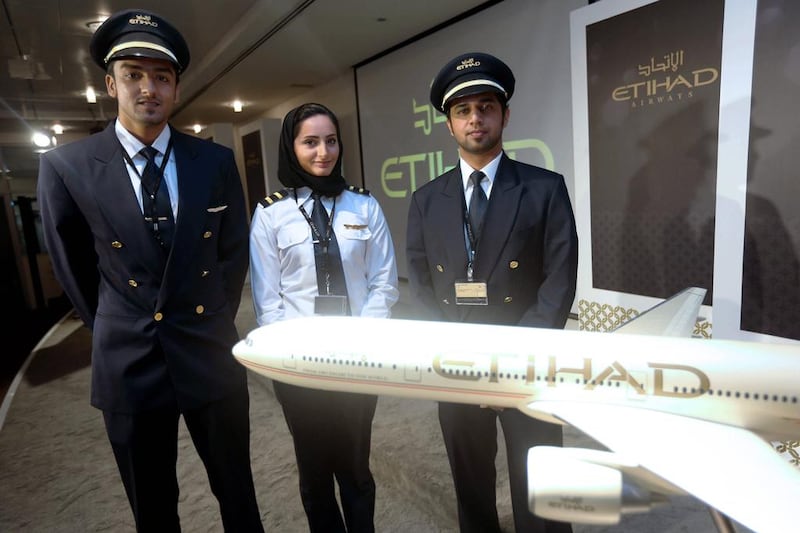Faisal Obaid Al Naqbi had a job that others can only dream of. He played professional football for Al Wahda Football Club.
But he had other dreams too.
A human resources graduate of Abu Dhabi Men’s College, Mr Al Naqbi wanted to follow in his father’s footsteps.
His father, a pilot in the UAE Air Force, was elated.
They went to a flying school in Germany in 2009, a year after the young Emirati’s graduation. He test flew with an instructor for an hour over the fields of Bautzen, near Berlin.
“I wasn’t scared, I was dreaming about it,” he said. “I felt more confident about flying after that.”
Soon, he enrolled for Etihad’s pilot training programme.
Mr Al Naqbi is one of about 50 Emirati pilots who graduate yearly from the Etihad Airways Training Academy. While most are enrolled in the pilot training programme, a handful participate in the cabin crew category.
The programme is part of the Abu Dhabi carrier's effort to build a future line-up of pilots and leaders.
It “gives the airline options for future leadership for operations roles and different management positions”, said Ray Gammell, the chief people and performance officer at Etihad. “Given we are growing at the rate we are, creating capability is the key.”
The UAE carrier is one of the world’s fastest growing airlines. It is expanding into South East Asia as well as North America and investing in foreign airlines such as India’s Jet Airways, Air Serbia, Virgin Australia, Air Seychelles and Ireland’s Aer Lingus.
Several management and operational roles – such as in safety, training, flight and airport operations – are held by pilots who still fly. For them, 30 per cent of the time is dedicated to flying to keep their certification, while the rest is taken up by their responsibilities on the ground.
Emirati cabin crew can also apply for similar ground jobs. This year, the airlines received 160 such applications from its cabin crew.
So far, six women have graduated from the pilot training programme, and 13 others are in training.
While graduates of the Etihad programme are free to join other airlines, all are absorbed in-house.
“And we need more,” said Mr Gammell.
Etihad has partnered Abu Dhabi University to allow applicants without a graduate degree to pursue a bachelor’s degree in aviation science, which can be completed in about five years.
After graduation, an applicant for the pilot training programme is required to complete 750 hours of ground training and 205 hours on a small aircraft. This can take about 18 months. After passing an examination, the students receive an air pilot transport licence and graduate to second officers. They then move to the Etihad academy to complete their simulator training – which can take up to a year. That is followed by 43 flights under the supervision of a training pilot. Upon successful completion, they graduate as first officers.
While Etihad would not disclose how much it spends on training the Emirati pilots, the training programme costs Dh500,000 for an international student.
The total number of cadets – second officers and first officers – is 518, including 387 UAE nationals and 119 international students.
Every year, about 10 international student pilots graduate from the programme.
Mr Al Naqbi is one of 76 second officers currently at Etihad.
“I am flying A320s and I am excited to go to bigger jets,” he said. “The most exciting part is connecting people from Abu Dhabi to the world.”
The 25-year-old is still undergoing training and expects to complete it in January. He currently flies short-range flights to Cairo, Beirut, the Seychelles and the Gulf countries besides India and Pakistan.
“That feeling, being above the clouds, is amazing,” Mr Al Naqbi said. “You feel that you are owning the world.”
So, would he like his two-year-old child to follow in his flight path?
“She is a girl, but if she wants I won’t stop her,” he said. “Because doing something else that you don’t like can leave you unfulfilled.”
ssahoo@thenational.ae





